Jason Arnett's Blog, page 32
February 11, 2013
Overtweaking
 I've been whacking away at trying to be a creative person for a number of years now. Well, all my life, really, but seriously for the last thirteen or fourteen. Well, only seriously for a total of five or six years of the last thirteen or fourteen. You get what I'm saying.
I've been whacking away at trying to be a creative person for a number of years now. Well, all my life, really, but seriously for the last thirteen or fourteen. Well, only seriously for a total of five or six years of the last thirteen or fourteen. You get what I'm saying.I hope.
Anyway, November of 2011 saw Evolver: Apex Predator hit digital shelves at Amazon and Barnes & Noble. Immediately following that book's acceptance by Actionopolis I began working on another for them.
We're about two steps closer to seeing that book come out. There's some cover artwork and the final edits have been turned back in. I'm hoping it's going to be ready sooner than later. Reading the book again before it goes out was weird. I looked at what I'd written and while I think it still tells a good story, I would have approached some things a little differently. As it was, I fixed some clarification things and just some minor housekeeping stuff.
If I were less secure, I could have kept tweaking little things here and there and here and there. Finally I sighed and decided it was time to let it go. So off it went in an email.
What inspired the re-read and edits was getting to see a preview of the cover.
Those are the little moments that have made me wanting to be a writer worth all the time and energy I've been putting in. Well, that and getting paid for writing the books. I guess that makes me somewhere between an amateur and semi-pro. Doesn't it?
Anyway.
All this led to another email that said go ahead on a third book that I turned in last year. The draft was in need of some attention and now that the other book is in production I'm feeling good about taking care of this one.
Look, I'm sorry to be vague but these are books that will definitely see the light of day. Through the fault of no one, little delays piled up around them and now it appears those have been cleared and we're rolling again. Here's to hoping that 2013 is the year of these books coming out and getting some attention. I'll need your help on that last part, but I'm good with the writing and editing bits.
I promise I'll share covers and announcements when I can. For now, I'm glad that the work is moving forward.
Published on February 11, 2013 04:30
February 8, 2013
The Confabulator Cafe
I've been kind of lax in reminding you every week to visit my writing group's blog, The Confabulator Cafe. It's a wonderful mix of writers exploring all the things that go into writing. Every week we have a prompt that pushes us to write about some aspect of storytelling. Categories include Writer's Life, Influence, Politics, Mechanics, and more.
What you get at the Cafe is all of us considering the week's question (this week's is Why Do We Need Stories?) and then being able to read ten or eleven or twelve responses, all from unique perspectives. Since we're all at different stages and want different things from being writers, it's often an eclectic mix of opinions and feelings and thoughts. I'm sure there are plenty of blogs by writers about writing all across the Internet (only about a million, I suppose) but this one is a little different. I think it's a little more honest and it's certainly a record of several journeys.
But we don't limit ourselves to only talking about our Processes or the Ephemera that go into writing, and in particular our writing. Every month we throw down and write a story to entertain our readers. Again, it's from a prompt and every story is unique. We don't all write in the same genres, either. We invite you to sample our writing styles and to show off how much fun we're having on this quest of ours. We're even writing in a common universe in the Straeon Manor stories with a bit of crossover in the last round.
What I want you to take away from this post is that while you have a lot of choices to spend your time on the Internet in pursuit of various entertainments or illuminations or just in wasting time, I think you might be taken with some of our bloggers there. I certainly am. I've learned a bit about other's processes and habits and been able to incorporate a bit of some of them here and there.
If for no other reason than we do it because we want to - we're not asking for your money, just a little of your time - come on over and read a bit while you're having your morning coffee. Pop the feed into your reader and keep up with what we're doing. Tell a writer you know about us. Who knows? We might be able to inspire someone to take the leap.
So consider this my honest attempt to entice you to visit The Confabulator Cafe, at least once, to see if there's anything you're interested in. Maybe it's just reading an entertaining post or maybe it's something else. Regardless, if you can all the Confabulators will be appreciative.
What you get at the Cafe is all of us considering the week's question (this week's is Why Do We Need Stories?) and then being able to read ten or eleven or twelve responses, all from unique perspectives. Since we're all at different stages and want different things from being writers, it's often an eclectic mix of opinions and feelings and thoughts. I'm sure there are plenty of blogs by writers about writing all across the Internet (only about a million, I suppose) but this one is a little different. I think it's a little more honest and it's certainly a record of several journeys.
But we don't limit ourselves to only talking about our Processes or the Ephemera that go into writing, and in particular our writing. Every month we throw down and write a story to entertain our readers. Again, it's from a prompt and every story is unique. We don't all write in the same genres, either. We invite you to sample our writing styles and to show off how much fun we're having on this quest of ours. We're even writing in a common universe in the Straeon Manor stories with a bit of crossover in the last round.
What I want you to take away from this post is that while you have a lot of choices to spend your time on the Internet in pursuit of various entertainments or illuminations or just in wasting time, I think you might be taken with some of our bloggers there. I certainly am. I've learned a bit about other's processes and habits and been able to incorporate a bit of some of them here and there.
If for no other reason than we do it because we want to - we're not asking for your money, just a little of your time - come on over and read a bit while you're having your morning coffee. Pop the feed into your reader and keep up with what we're doing. Tell a writer you know about us. Who knows? We might be able to inspire someone to take the leap.
So consider this my honest attempt to entice you to visit The Confabulator Cafe, at least once, to see if there's anything you're interested in. Maybe it's just reading an entertaining post or maybe it's something else. Regardless, if you can all the Confabulators will be appreciative.
Published on February 08, 2013 04:30
February 6, 2013
Don't Pirate My Book(s)
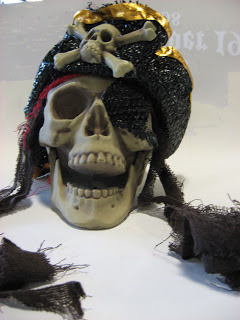 The pirate laughs at my feeble attempt to
The pirate laughs at my feeble attempt toappeal to his sense of decency.Because Chuck Wendig says.
Look, I'm at the very beginning of any kind of writing career, here, and I've only got one book out. Another is on its way and the third one is getting close, too, and that means I've got to say something about piracy.
Yesterday, Wendig did one of his famous 25 Things... lists about pirating books. He mentions things like buying and selling used books, mix-tapes and loaning books and such as examples of 'stealing' and yes, they are. To a degree. Buying used is akin to recycling (he said in the hopes that he didn't sound too desperate to justify a habit) even though it doesn't benefit the author/creator. Used cars? Same thing in my book. I think we should use things until they don't have any more use rather than just trashing them when they're not shiny and cool any more. But that's another post.
Mix-tapes are okay in my book, too, because it's about re-mixing various elements to create a mood. As long as the mix-tape isn't resold, I don't see a problem with it. At that point it becomes a compilation that should be sanctioned by a label and paid for. Re-mixing things to make money off them is stealing and should be avoided. (I'm looking at everyone who's taken a novel in the public domain and put fucking zombies into them. Stop that. Stop ir right now.) That's not clever, that's unimaginative.
Loaning books? Well, I have no issue with loaning things I paid for. Generally whomever I loan things to will return the favor, and both of us have paid for something. That's got to be okay.
I should confess at this point that I've torrented exactly one thing. As it turned out, the thing was freely available and in the public domain, with no copyright claim on it. I've always paid for music (or gotten it from someone who paid for it in return for something I paid for) and downloading things that aren't available yet has always bothered me. I want to wait for the final, approved version to hit the shelves. I don't want to watch something subtitled in Czechoslovakian (try typing that fast, American swine) that looks like it was photographed by a video camera in front of a TV at midnight on a busy street. I don't want to hear cat yowling for food while I'm trying to watch the movie, either.
What I want is for things that are popular to run in America at the same time as they do in England. (That's a Downton Abbey reference for those of you keeping score.) Because the world is so interconnected now, it makes sense for those kinds of things to happen. Sherlock should run at the same time in America as it does in England. That's going to stop all sorts of pirating. At least Doctor Who finally runs, though a few hours later. Ah, I'm wandering again.
Are there pirated copies of my one released book? Yep. I've discovered them out there. Are they virus-carriers? I don't know, I didn't download them. I did let the publisher know. I did what I could.
To be honest, I felt a kind of good when I found the files listed in small European countries. I felt like I'd made it as an author. Sort of. Of course it could be that someone just pirates everything he sees and throws it out for anyone who wants it.
But I don't want you to pirate my book. I want you to read it. Pay for it. Help me make more stories you might want to read by buying it. Help the property develop into other media. "Whoa, this would make a cool movie! They should make one!" If you buy it and get others to buy it, too, that might happen.
I understand pirating. I do. I don't participate in it because I like to support the artists and creators whose work I like. Don't blame them for price points. Don't punish them for a publisher's decision, either.
Finally, don't pirate my books. Please. I appreciate the thought, but it's hurtful. If you must, if you can't stop yourself from doing it, at least find some way to support the work so that I can continue to make more. Or maybe we'll be able to make a movie.
Published on February 06, 2013 04:30
February 4, 2013
Being Influenced
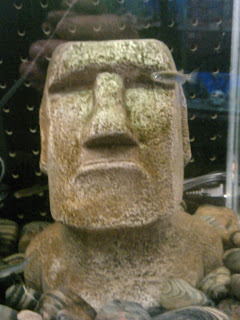 You should be writing. I will haunt your
You should be writing. I will haunt yourdreams.There are so many people who have contributed to who I am and how I do things today. Many, many of them don't know but some do. If you look closely you may be able to discern for yourself just who's given me what.
This goes back to having read Austin Kleon's rather inspiring book Steal Like An Artist. In that book he challenges that nothing is original, that the sheer act of 'stealing' from multiple sources/influences is what makes a work original. Neil Gaiman's assertions, too, that each of us should "do the work that only you can do" is important. In fact, I think Kleon's book is on a parallel track with Gaiman's ideas.
Did he steal from Gaiman? Or the other way around? Or were they both influenced by the same things?
I can't honestly say. It doesn't matter.
Maybe they're both tapped into a collective unconscious and they hit at the same time. The world, the universe, is filled with the possibility of coincidence, isn't it?
Knowing a little about the vagaries of publishing, I suspect that they were both influenced by something similar and they'd both been thinking about it long enough to come to the same (sort of) conclusions.
That happens to me and it's probably happened to you, too. I will admit here that I've been influenced by conversations amongst the members of my writer's group, by my friends in other parts of the entertainment industry, and by people at work. I have been influenced by reading, seeing films, listening to music and watching TV. Haven't we all?
Kleon, in his book, exhorts me (not me, in particular, but the readers) to embrace all the diversity that filters into my consciousness, write it down and save it for a time when I'm open to the ideas, when I can use them the best. Frankly, I've been doing that for a lot of years now but it's never been said quite so convincingly that I'm on the right track by doing this. I've gotten the idea from reading about the processes of other writers to keep a notebook - or at least scraps of paper - and a pen mostly handy. I've got dozens upon dozens of sticky notes with cryptic sentences or quotes or a song lyric or a movie title on them in my bag. Periodically I sort them out, transfer them to my idea dump and toss 'em.
When I'm looking for an idea to pursue in writing a story or a blog post, even, I will open the idea dump and peruse. Once I've used the idea, I cross it off without deleting it. There have been times when I've used the same idea in a different way because something else has come along and a new insight has been achieved.
So that's what influence is really about: making original work with the ideas of others having run through filters and being combined in ways original to me.
That's the most important part. My perceptions are what make my work MY work. I'm pretty sure everyone understands that. It's like seeing John Romita's Spider-Man next to Steve Ditko's Spider-Man next to Todd McFarlane's Spider-Man: the character is recognizable but definitely not drawn in the same way.
The act of writing this post has inspired me, in fact, to think about why plagiarism isn't a bigger deal; why the threat of lawsuits keeps writers and other creatives from helping more people for fear of being sued for 'stealing' someone's idea.
I suppose it's simple jealousy. It couldn't possibly be the collective unconscious reaching out to two separate people having somehow experienced the same things.
Can it?
Published on February 04, 2013 05:02
February 1, 2013
The Future in My Head
 This is the kind of abstract work that causes me to see things
This is the kind of abstract work that causes me to see things differently and to wonder about what comes next.
Giacomo Balla, Abstract Speed + Sound, 1913–1914.
Borrowed from the Wikipedia entry on futurism.In preparing to write this post, I did some minimal research into 'futurism' and being a 'futurist'. Enough to know that I've been using those words incorrectly to this point. 'Futurism' is about the Italian movement that focused on speed, technology, youth, violence. I am not exactly a 'futurist', either, because I'm not necessarily trying to predict the future but rather trying to see myself in it.
I've played music, made art, speculated about any number of things in my writing. Maybe that makes me forward-thinking, but a futurist? Not by strict definition because I'm not a scientist. I admire the paintings and architectural designs of The Futurists. They inspire me. More, they inspired the Art-Deco movement which really speaks to me.
By wanting to be and then consciously pursuing being a writer of science fiction I'm landing in a camp that's been well-established. Those who've gone before are giants in the field. There are a lot of folks who have set up their tents in this camp who were wildly successful in predicting all sorts of things (Jules Verne being the best example of 'wildly successful', I suppose) and dozens upon dozens more. But this isn't about them.
How did they do it? What flights of fancy or bolts of inspiration caused them to think ahead like they did?
Obviously they were readers. They were thinkers on what they read, and I suspect that many of them (like Verne) sought out thinkers and scientists and engaged them in conversation. Picked their brains and then began the process of extrapolation.
This is what I try to do, thinking about the fields of my own interests and how they intersect with my daily life. My job is in college foodservice and has been for half my life. I've got stories that don't necessarily involve working in food but that have been inspired by what I've experienced there. It's a way for me to relate to the work I'm doing during the day to the things I think about when I'm not doing that (or really anything else).
I daydream stories. What if? What then? What next?
My admiration for people who can work across different aspects of the arts (visual, performing, literary, gastronomic, 'mathematical') is greater than anything. Of the seven 'arts' I've tried my hand at four with varying degrees of success. If you add in the eighth and ninth, I've worked at (to some degree) six of them.
But I'm always looking at the horizon, trying to see which path leads me to the next thing, the next idea. I doubt that makes me a futurist but it does mean I'm thinking AT the Future. Trying to grasp something that has meaning.
It means I'll keep trying until something sticks. Indulge me in a prediction that I'll continue to expound here and wherever anyone will have me. I'll be the guy in the coffee shop or the bar with a book in hand, trying to figure out what's next.
Published on February 01, 2013 04:30
January 30, 2013
The Culture of Donating (Or Not)
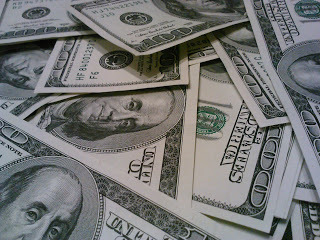 Donations are cool but they don't need to be big
Donations are cool but they don't need to be bigpiles of cash to be effective. I've got work to do - writing - but this is on my mind so out it goes.
America is a donating culture nowadays, especially in the wake of a disaster. The folks in Joplin, Missouri, and the victims of Hurricane Sandy especially understand that. So do a lot of other people. We look at the news (or the weather or sports or whatever) and our hearts break when we see people in pain. Our instinct is to hug them and tell them it'll all be okay. Well the majority of people share that instinct, I'm generalizing to get the point across. We like to donate things.
On NPR recently there was a story about the unnecessary and often overwhelming things that become problematic in the wake of a tragedy. Too many teddy bears, not enough money. Piles and piles of clothes that create storage problems and not enough money to pay the folks or buy what's really needed. An enterprising group decided that encouraging those who want to help but don't want to send money per se ought to check out a web store and buy things there that will go to immediately filling desperate needs. This is a great idea.
But how often do we support things that enlighten us? I mean, back in the old days we used to subscribe to magazines and join book clubs and things like that to find material that informed or enlightened or entertained. Now there's the Internet and way too many options to choose from. If you're of a certain age you remember that packet of stickers from Publisher's Clearing House. I know some who loved those little stamps with a mighty desire to put them all over EVERYthing. (Not me. Nope.)
Last week I decided I was going to let a couple of magazine subscriptions go because I wasn't reading them as they came in. This made me a little sad because it meant that there were a few less items for the USPS to deliver to the house and I want the Postal Service to continue as it has, though that's a subject for another time. But now I have a few dollars that I'm not sending to a publisher to send magazines, so what am I going to do with it?
First, I'm going to support one website that I'm getting a lot of enlightenment from, lots of insights into what I want to do with my life. I've sent them the equivalent of a year's subscription to one of the magazines I just dropped.
This made me think: If everyone who reads a website 'subscribed' for only a dollar a month, the websites would likely be improved just a little bit. The authors could spend that much more time on their labor of love. It's a minimal investment on my part, but if 100 people did it, the author would be beholden to investors/readers, and might do better work out of some sense of obligation. Or not.
Second, I've still got that renewal money I wasn't going to give to another publisher so I'll decide which website deserves my support. If they have a tip jar or a PayPal link where I can send them a few bucks, I'll do it. It's nice to know that someone appreciates your work and is willing to pay something for it. In this day and age of the Internet, it's time for micropayments to really matter. It's up to us as readers to decide how much.
I would recommend that if every listener to every local NPR station just sent in $5 a year, the pledge weeks would probably be a lot shorter. Maybe $10. For an entire year, folks. They say every dollar counts and I believe that.
When it comes time and you think you want to send something to help someone out, think about all the things you take for granted and what you don't pay for on a daily basis. Think about the things you read for free that a dollar a month would be good for. You might help someone get health insurance or eat or be able to put gas in his car to get out of the way of a killer superstorm.
This argument is rambling and way all over the place. What I want you to take away is that a dollar a month for every person who reads a particular website isn't too much to ask.
Is it?
Published on January 30, 2013 04:30
January 28, 2013
Characters and Plot in Parallel
 How many lines do you see?I'm always looking for ways to express what I'm thinking about how I write, why I write and why and how I think things work. Not having a degree in English or Writing or Creative Writing, my search is exclusively independent, wandering far afield from one thing to another. I rely on the advice of others (that's the subject of another blog post another time) and the experience of writing for any audience that'll pay attention. (And thank you for reading here. I very much appreciate it.)
How many lines do you see?I'm always looking for ways to express what I'm thinking about how I write, why I write and why and how I think things work. Not having a degree in English or Writing or Creative Writing, my search is exclusively independent, wandering far afield from one thing to another. I rely on the advice of others (that's the subject of another blog post another time) and the experience of writing for any audience that'll pay attention. (And thank you for reading here. I very much appreciate it.)Back in March of 2012 I took a stab at explaining why character wasn't more important than plot and vice versa. Rereading that post at the Confabulator Cafe, I realize that I've learned a little more since then and it may be time to update my thoughts. Not the roots of the thought, mind you, but maybe I've come up with an explanation that may make a little more sense.
I read Austin Kleon's book Steal Like An Artist (three times) and he illustrates something in the book that really, really resonated with me. An art school exercise where you draw two lines close together, pretty much as identically as possible. The student is then asked how many lines he sees.
The answer is supposed to be three: the two drawn and the one implied in between.
Now my idea is that the three lines symbolize the bits that readers care about: Character, Plot, and Story. Here:
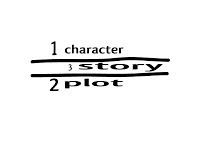
It's not necessary for character to be on top or plot to be on the bottom but story has to be in the center. Nor should you pay attention to the sizes I've written any of the words in the drawing. The important bit is that Story is in the center. What I'm aiming at is that Character on the outside represents all the work an author puts into developing those people. Same thing with Plot. The implied line is, of course, Story. Because Character and Plot combine to make a Story. A believable story has strong characters and a good plot that moves forward with purpose. I think we can pretty much agree on that, can't we?
So. I'm going make an amendment at this point that ties together all the things I've been exploring over the last little while here. When I say 'story' in this regard, I mean the throughline of my story. A then B then C, etc... What makes a story memorable is how the reader retains it.
Stay with me. Obviously they read it one page after another, sometimes skimming over the boring bits. Hopefully I've eliminated as many of those parts as possible but maybe not. We'll see. Anyway.
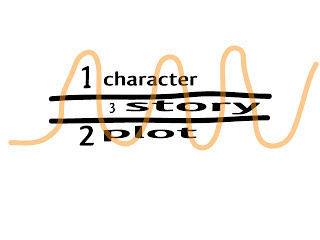 When you tell a story to someone (like a prank you pulled, for instance, or when you're gossiping or even lying or sharing a deep dark secret) you don't necessarily go with the throughline, do you? I bet not. I bet you digress here and there to explain some details - who was there and their relationship to you or the event, what was going on right before the story started or where it happened - sometimes as you go along and sometimes not. Here's a diagram of how I think that works:
When you tell a story to someone (like a prank you pulled, for instance, or when you're gossiping or even lying or sharing a deep dark secret) you don't necessarily go with the throughline, do you? I bet not. I bet you digress here and there to explain some details - who was there and their relationship to you or the event, what was going on right before the story started or where it happened - sometimes as you go along and sometimes not. Here's a diagram of how I think that works:Again, maybe I'm right maybe I'm not. This is how I'm thinking of it now. Which is why I'm sharing it. Anyway. You can flip the S-curve either way for the reader/listener to come in on the character side or the plot side and it still works. During every story, there are plot moments and character moments as the tale drives forward. I think a good story has equal amounts of both but you can modify the curve any way you like.
This is anecdotal evidence on my part, from listening to stories, reading them, and telling them. Your mileage probably varies. But this is how I write. I want characters interacting across a cool plot that makes for an entertaining story. When readers tell others about a story I've written I would bet that they'll share bits about the characters and bits about the plot that actually tell the story.
At least, that's the theory.
Published on January 28, 2013 04:30
January 25, 2013
Things Left Unsaid
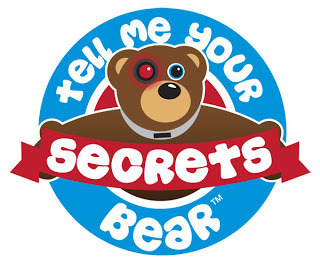 TMYS Bear will give your secrets the treatment
TMYS Bear will give your secrets the treatmentthey deserve. Swiped from ThinkGeek. Who doesn't have a secret? There's a subject that's always verboten in regards to nearly every person I know. Things that just aren't spoken of. Things that further discussion will not solve.
Now not every secret is 'juicy'. Some are uncomfortable, subjects that have no bearing on the situation at hand. Some are tiresome, subjects that have been beaten to death by endless discussion over drinks, food, even while impaired on illicit substances.
But the secrets we keep are what make us interesting to others. The things we keep to ourselves are what intrigue others. The mystery is what tantalizes, don't you think? Come on. Admit it. Here, have another drink and I'll distract you with something I'm willing to let go of because I trust you. Oh, go on, you know you want to tell me. I'm making it okay for you to share. You can trust me.
So along with the other things we've been exploring over the last week, secrets are really about trust. The things we choose not to share also help to define us. Sometimes we choose not to share out of shame or self-disappointment, sometimes because what we know will hurt someone else. There are secrets that are difficult to keep to oneself but because you might have been trusted with them you cannot share. That's the burden of hearing things we don't want anyone else to know, isn't it?
Secrets, being about trust, are weighty things. Sometimes trust is misplaced when your confidante betrays your secret. We all know there's only one person who can absolutely be trusted with the Deep Dark Secrets: the person who owns the secret first. That weight is significant and can affect behaviors. Best friends can sense when a new weight has been added. That's when a conversation happens. Have some more wine.
Look, I'm thinking out loud here. There are things I don't tell you, that I don't tell others. If you know something about me I guarantee there are others in my circle who don't know what you do. They may know parts, but not the whole thing. I'm the only one who knows everything about me.
However, if you put a group of my friends and acquaintances together and you all shared what you knew (not that you have permission to do that - wait until I'm dead at least), there might come a clearer picture of who I am. But you won't know everything. There will be key details missing. There also won't be a 'Rosebud' clue. I also don't think I've shared anything with anyone who has had to take on the weight, that causes any conflict. I may be wrong but I'm not aware of having done that.
I'm not a therapist and I only know one person who is. Secrets can be destructive and damned heavy. You'll be better off if you can trust someone to help you put that weight on the ground and inspect it from another perspective.
Published on January 25, 2013 04:30
January 23, 2013
The Truth of the Lie
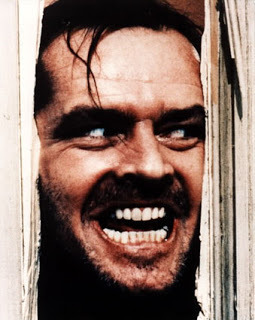 The truth can get in the way so that's when
The truth can get in the way so that's whenit's appropriate to get an axe.So over the last three posts I've been exploring the little stories that people tell in the real world. Stories of pranks, rumors, and lies. It's interesting to see how the three fit together because certainly one can lie about having pulled a prank, or being the victim of one. Rumors are almost certainly lies in the beginning, inventions of the creators, though they can easily be leaks from sources wanting to generate interest in whatever. Outright lies are just meant to hurt their victims or, at the minimum, cast the teller of the lie in the best possible light.
And so characters have to use these little stories in a writer's larger stories. It's easy to believe that a character (narrator or otherwise) is always truthful. And as a writer I'm intrigued with writing a book that contains a cast of liars. Not just points of view shifts but actual lies, rumors, anecdotes, stories, that lead the reader to wonder just who, if anyone, is telling the truth.
I don't know if I'll write this book and I'm sure it's been written a dozen times before but I have a take that I want to use in pursuit of that. Something about exploring the nature of truth. Truth, I guess. What is true and does the truth really hurt as badly as a lie? Sometimes our feelings are spared in service of The Greater Good. But is The Greater Good, itself, a lie?
Sometimes.
This is why I like being a storyteller. Being able to poke around and see what intrigues me, then go exploring with care and dedication to the story itself. The possibilities are truly endless. The open road beckons.
That's all I'll say about the possibility of writing this story. It's in a file on my desk and I'll let it simmer, add some bits and pieces here and there until it marinates enough. This one's big, though. It may never happen. I may not be the writer I want to be in order to write it.
Then again, given some time and some confidence I may be the guy to write this story. I've already been thinking about it for several months. That's why we've been thinking about lies and rumors and stuff.
Or maybe I'm pulling your leg with all of this. We'll have to wait and see, I suppose.
The truth will out.
Published on January 23, 2013 04:30
January 21, 2013
Little Whites
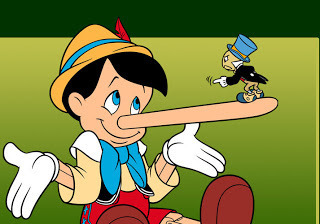 He'll say what you want to hear in order to achieve his
He'll say what you want to hear in order to achieve hisgoal of being a real boy. This is a story about lies. Or vice
versa.Ever told a lie? Then you're a storyteller. It's that simple.
When I was very, very young I did a drawing on the wall of my parents' home and signed my brother's name. He was just getting sort of facile with crayons and I don't remember my motivation in doing the drawing in the first place but I'm told I did. I have no recollection of the event so I can't say but I can certainly infer that I wanted to get away with doing something that I knew was wrong.
The way I hear the story is that my Mom asked me what I'd done, why had I drawn on the wall? "I didn't," I said (again, this is what's been reported to me over the years), "[my brother] did. See? He signed his name." I pointed and was probably pretty proud of myself. I can imagine that even if I don't exactly remember.
"He couldn't have," Mom says. "He spells his name backwards."
Dammit, I was busted.
There have been other lies over the years, various things here and there. All of them are stories. All of them designed to make me look better to whomever I was talking to.
And I've been lied to, as well. By people near and dear to me, even. Hell, we all have if you think about it. Generally the lies we hear and the ones we tell are not meant to hurt someone else but sometimes they do. Sometimes you run into the one reprehensible person who creates a lie from a germ of truth that others are willing to believe. When the accused admits to the partial truth it only sinks her deeper. If that one part is true why not the rest?
That's the scary part of being the victim of a lie, when just enough truth is embellished with more than enough lie. It can change the course of the victim's life.
In some instances. Your mileage may vary.
The point I'm making here is that lies - that is, untrue stories - are meant to make one person look better than another for the gain of the person telling the lie. Simple lies are one thing, where saving face is what's important. I understand that. No one wants to look foolish when a mistake has been made and throwing someone else under the bus is easier than owning up to your mistake.
The big lies, the ones that ARE meant to hurt, are the worst. Anyone who's been the victim of one of those lies will understand.
How difficult is it to lie? Some people are very good at it, as if it comes naturally to them. Others are not, you can tell immediately that they don't know the tradecraft of lying.
But that makes all of them, all of US, storytellers. That means that - whether good or bad - we can invent something that could plausibly be the truth. Put two people together and you'll get different accounts of the meeting. That's point of view, isn't it? If you assume they're both telling the truth. However if one of the storytellers is unreliable - meaning you believe he could lie to you - then the stories not only get interesting, they become compelling.
And that's when people can get hurt, when lives can be changed. Sometimes those changes end up being the best thing that can happen. But it can be a long road to getting there, and that road is fraught with all sorts of dangers, not the least of which is depression.
Which is a lie you keep repeating until you believe it to be true. (I know this isn't the absolute truth, but it is a truth. One of many regarding the disease of depression. I'm making a point here, bear with me. I understand. Really. No, really.)
And what happens then? The axiom that the lie repeated becomes the truth is an axiom because it's TRUE.
So we're all lying liars. Care to share a lie you've told? The same rules apply: nothing that hurt anyone terribly. Change names, dates, places, but feel free to share.
Published on January 21, 2013 04:30



